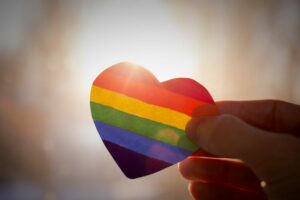While societal acceptance and legal protections have significantly progressed, individuals identifying as homosexual still face a unique set of challenges that need to be understood, addressed, and ultimately dismantled. Our exploration of these issues is not an endeavor to stigmatize or segregate. Rather an effort to shed light on these challenges in order to advocate for a more inclusive, understanding, and equal society. In this blog post, we will delve deep into these homosexual problems, and examine the various facets of these challenges. And also, discuss potential strategies to foster a more equitable society.
Contents
What Is Homosexual Behaviour?
 Homosexual behavior refers to any behavior that indicates a sexual or romantic attraction towards individuals of the same sex. It’s observed in many species, not just humans. And is part of the broader spectrum of human sexuality and behavior.
Homosexual behavior refers to any behavior that indicates a sexual or romantic attraction towards individuals of the same sex. It’s observed in many species, not just humans. And is part of the broader spectrum of human sexuality and behavior.
For human beings, homosexual behavior might include but isn’t limited to:
- Sexual Activity: Engaging in sexual acts with individuals of the same sex.
- Romantic Behavior: Demonstrating romantic interest or developing emotional connections with individuals of the same sex, such as dating or expressing love.
- Social Behavior: Exhibiting social preferences for same-sex individuals. Such as choosing to spend time with same-sex individuals or forming close bonds with them.
- Self-Identification: Identifying oneself as gay, lesbian, or otherwise indicating a preference for same-sex relationships.
It’s important to note that these behaviors don’t necessarily define one’s sexual orientation definitively. Some individuals might engage in homosexual behavior at some point in their lives but not identify as homosexual, or their behaviors may change over time. It’s a deeply personal aspect of one’s identity, and each person determines how they identify themselves.
What Are Some Common Homosexual Problems?
While it’s important to stress that not every individual who identifies as homosexual will face these issues, many people within this community face a set of common problems. That stems from societal prejudices, discriminatory laws, and stigma. These issues largely arise from societal responses to homosexuality. Rather than being inherent to homosexuality itself.
Societal Stigma and Discrimination
Homophobia, or negative attitudes, beliefs, and biases against homosexuality, is still a prevalent issue in many societies around the globe. It can result in discrimination against homosexual individuals in various forms, including exclusion, rejection, verbal and physical abuse, and sometimes even violence. This discrimination can occur in numerous aspects of life, such as within families, schools, workplaces, religious institutions, and social settings. The negative impacts of such discrimination are wide-ranging and can contribute significantly to stress and anxiety, poor mental health outcomes, lower self-esteem, and diminished quality of life.
Mental Health Issues
Experiences of discrimination, stigma, and rejection can have severe effects on mental health. Research has shown that homosexual individuals may be at higher risk for mental health issues like depression, anxiety, substance use disorders, and suicidal ideation and attempts. This heightened risk is often related to minority stress – the chronic stress experienced by individuals belonging to a stigmatized minority group. Lack of societal acceptance, internalized homophobia, and experiences of prejudice and discrimination are key contributing factors.
Bullying and Harassment
Homophobic bullying, whether verbal, physical, or online, is a substantial issue, particularly among youths. Such bullying goes beyond just harm to the individual. In fact, it can create a hostile environment, leading to absenteeism from school, lower educational achievements, and poor mental health outcomes. It can also contribute to a higher rate of suicide attempts among homosexual youth compared to their heterosexual counterparts.
Coming Out
The process of disclosing one’s sexual orientation to others, often referred to as “coming out,” can be a significant source of stress for many homosexual individuals. While this process can be a liberating and positive experience for some, for others, it may be fraught with fear and anxiety due to concerns about potential negative reactions, rejection, discrimination, or violence. The worry about how families, friends, and colleagues will respond can lead to significant emotional distress and mental health problems.
Healthcare Inequality
 Homosexual individuals often face barriers to equitable healthcare, arising from a combination of discrimination, stigma, and a lack of cultural competency among healthcare providers. For instance, doctors may not fully understand the unique health needs and concerns of homosexual patients, or patients may avoid seeking healthcare due to past experiences of discrimination. Additionally, despite the increased risk for certain health issues, such as mental health problems and sexually transmitted infections, appropriate preventive services and interventions may not be adequately provided. These disparities can lead to worse health outcomes within the homosexual community.
Homosexual individuals often face barriers to equitable healthcare, arising from a combination of discrimination, stigma, and a lack of cultural competency among healthcare providers. For instance, doctors may not fully understand the unique health needs and concerns of homosexual patients, or patients may avoid seeking healthcare due to past experiences of discrimination. Additionally, despite the increased risk for certain health issues, such as mental health problems and sexually transmitted infections, appropriate preventive services and interventions may not be adequately provided. These disparities can lead to worse health outcomes within the homosexual community.
Legal Discrimination
Even though many jurisdictions have passed laws protecting the rights of individuals regardless of their sexual orientation, in many parts of the world, homosexual individuals still face legal discrimination. This can range from the criminalization of homosexual behavior to legal discrimination in areas such as employment, housing, and family law. This can lead to a range of negative outcomes, from jail time and fines to being fired, evicted, or denied custody of children solely based on sexual orientation.
Internalized Homophobia
This refers to the internalization of negative societal beliefs and stereotypes about homosexuality by homosexual individuals themselves. It often results in self-stigma, guilt, shame, and a decreased sense of self-worth. It can also lead to denial or concealment of one’s sexual orientation, negatively impacting mental health and preventing the formation of authentic relationships. The stress from internalized homophobia can contribute to various mental health issues such as depression, anxiety, and substance use disorders.
Relationship Recognition
Relationship recognition refers to the legal acknowledgment and protection of relationships, including access to marriage and all the legal rights and responsibilities it entails. Despite advances in many parts of the world, same-sex marriage remains illegal in many countries. This lack of legal recognition can have a significant impact on homosexual couples, affecting everything from their ability to make medical decisions for their partner, to their access to benefits and protections related to taxes, healthcare, and child custody. This lack of legal recognition can contribute to feelings of inequality, invalidation of their relationships, and numerous practical difficulties.
It’s important to note that while these challenges exist, they are not insurmountable. With societal acceptance, education, advocacy, and supportive policies, it’s possible to address and mitigate these issues. The homosexual community, like any other, is filled with resilience, strength, and a rich diversity of experiences.
How To Cope With Homosexual Problems?
 Coping with homosexual problems often involves a combination of personal strategies, support from others, and seeking help from professional resources. Here are some strategies:
Coping with homosexual problems often involves a combination of personal strategies, support from others, and seeking help from professional resources. Here are some strategies:
- Self-Acceptance
Accepting one’s sexual orientation is a crucial first step. This may involve challenging and working through internalized negative beliefs about homosexuality. Remember that being homosexual is just one aspect of your identity and doesn’t define your worth or value.
- Building a Support Network
Surround yourself with accepting and supportive individuals, such as friends, family, or mentors. Joining local or online LGBTQ+ communities can also be very helpful. As it allows you to connect with others who have shared similar experiences.
- Seek Professional Help
Mental health professionals can provide much-needed support. Therapists who specialize in LGBTQ+ issues can be particularly helpful. They can provide strategies to cope with stress, anxiety, depression, or self-esteem issues, and guide you through processes such as coming out.
- Advocacy and Activism
Getting involved in advocacy or activism can help to combat feelings of helplessness or frustration stemming from societal discrimination. This could involve participating in events like pride marches, joining or starting a student or community group, or supporting LGBTQ+ rights organizations.
- Education
Educate yourself about homosexuality and the broader LGBTQ+ community. Understanding your identity and its history can help foster a sense of pride and belonging.
- Healthy Lifestyle
Regular exercise, a balanced diet, and adequate sleep can all help manage stress levels and contribute to overall well-being. Avoiding harmful substances, like excessive alcohol or drugs, is also important.
- Stay Safe
If you are in a situation where it is not safe for you to be open about your sexual orientation, prioritize your safety. Seek out discreet support resources, like online communities or hotlines.
Remember, it’s okay to ask for help and take time to care for yourself. The homosexual problems associated with being a part of a marginalized community can be tough, but many resources are available to help.
Conclusion
As we peel back the layers of the challenges faced by the homosexual community, it’s crucial to recognize that while progress has been made, much work still remains. From societal acceptance to legal protections, mental health support, and equitable healthcare, the path toward equality and freedom from discrimination is multifaceted. Yet, it’s important to stress the resilience and strength of the homosexual community and the incredible strides made in visibility, acceptance, and rights over the years.
Ultimately, the goal should be to create a world where every individual, regardless of their sexual orientation, feels valued, accepted, and free to live authentically. Each one of us has a part to play in making this vision a reality. Life may sometimes be challenging if you are gay, but Online Gay Counseling can help. Get experienced LGBTQ therapists at PrideMantra: Book a trial LGBTQ therapy session


